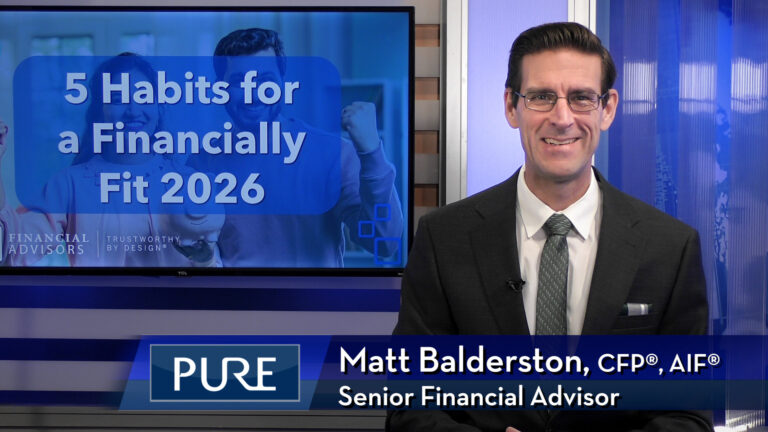Planning for retirement is a crucial part of securing your financial future. Deciding the ideal age to start receiving Social Security can affect the monthly benefit you will receive for the rest of your life and may affect protection for your survivors. Pure’s Financial Planner, Rachel Füss, CFP®, AIF®, will guide you through strategies to help you navigate your options so you can make a well-informed decision.
FREE GUIDE | Social Security Handbook
Transcript
I get asked all the time; what’s the best age to start receiving retirement benefits? The answer is that there’s not a single best age for everyone and, ultimately, it’s your choice.
Would it be better for you to start getting benefits earlier with a smaller monthly payout for more years or wait for a larger monthly payout for a shorter timeframe? The decision is very personal. It depends on factors in your life, such as your cash needs, your current health, and family’s longevity. Also, consider if you plan to work in retirement, if you have other sources of income, that’s a factor too.
You can start your retirement benefit at any point from age 62 up until age 70. Your benefit will be higher the longer you delay your start date.
So, let’s say you turn 62 in 2023, your full retirement age is 67, your monthly full retirement age benefit is $1,000. If you start collecting benefits at age 62, it’ll be reduced to 30% down to $700 to account for the longer time you receive your benefits. This decrease is usually permanent. So, if you choose, instead, to delay your receipt of benefits until age 70, you would increase your monthly benefit by 24% up to $1,240. This increase is the result of delayed retirement credits you earn for your decision to postpone collecting benefits past your full retirement age. The benefit at age 70 in this example is about 77% more than the benefit you receive each month if you started collecting benefits at age 62.
If you have a My Social Security account, you can get your Social Security statement, verify your earnings, and get personalized benefit estimates at www.ssa.gov.
When you think about retirement, be sure to plan for the long term. Many of us will live much longer than the “average” retiree, and most women live longer than men. About one out of every three 65-year-olds today will live until at least age 90, and one out of seven will live until at least age 95.
Weigh all the facts carefully before making the crucial decision about when to begin receiving Social Security benefits. This affects the monthly benefit you will receive for the rest of your life and may affect protection for your survivors. If you need help in this or have other retirement planning questions take advantage of Pure’s free financial assessment, get them answered.
Subscribe to our YouTube channel.
IMPORTANT DISCLOSURES:
• Investment Advisory and Financial Planning Services are offered through Pure Financial Advisors, LLC, a Registered Investment Advisor.
• Pure Financial Advisors LLC does not offer tax or legal advice. Consult with your tax advisor or attorney regarding specific situations.
• Opinions expressed are subject to change without notice and are not intended as investment advice or to predict future performance.
• Investing involves risk including the potential loss of principal. No investment strategy can guarantee a profit or protect against loss in periods of declining values.
• All information is believed to be from reliable sources; however, we make no representation as to its completeness or accuracy.
• Intended for educational purposes only and are not intended as individualized advice or a guarantee that you will achieve a desired result. Before implementing any strategies discussed you should consult your tax and financial advisors.
• Pure Financial Advisors, LLC, is not affiliated with any government agency, including, but not limited to the Social Security Administration.
CFP® – The CERTIFIED FINANCIAL PLANNER™ certification is by the Certified Financial Planner Board of Standards, Inc. To attain the right to use the CFP® designation, an individual must satisfactorily fulfill education, experience and ethics requirements as well as pass a comprehensive exam. Thirty hours of continuing education is required every two years to maintain the designation.
AIF® – Accredited Investment Fiduciary designation is administered by the Center for Fiduciary Studies fi360. To receive the AIF Designation, an individual must meet prerequisite criteria, complete a training program, and pass a comprehensive examination. Six hours of continuing education is required annually to maintain the designation.












